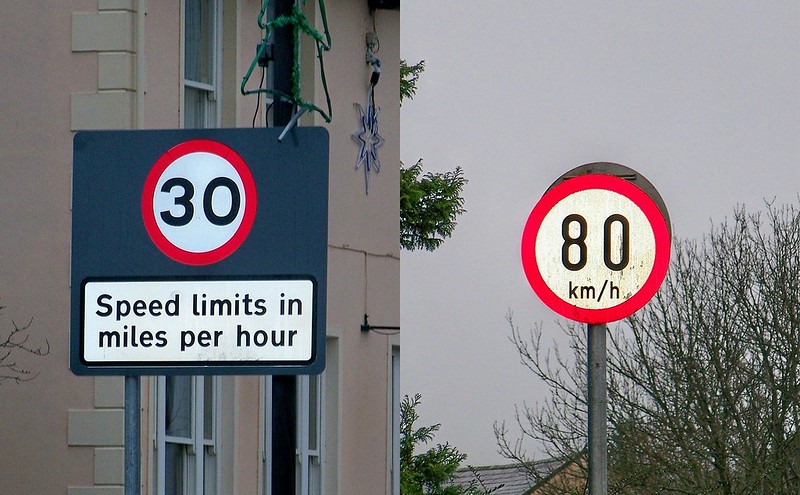And This is How it Ends? An Irish Borders Trajectory
Professor Cathal McCall looks at how the implications of Brexit have threatened to reverse the debordering momentum that had been gathering on the island of Ireland over the past 30 years.

The trajectory of Irish borders began with bordering on the island of Ireland after the partition in 1921-22. Seventy years passed before debordering on the island took hold. The long, tortuous Brexit negotiations (2016-2020) threw a spanner in the works, threatening to reverse that debordering momentum. Instead, it made manifest an ‘Irish Sea Border’.
However, British Government recalcitrance on the Ireland/Northern Ireland Protocol attached to the EU-UK Withdrawal Agreement (agreed in October 2019) gives rise to the possibility of a ‘Celtic Sea Border’ as a forced alternative. The end of this Irish borders saga may well be borderlessness on the island of Ireland and a ‘united Ireland’ in some form or other.
Irish Border
Debordering denotes the dismantlement of physical border infrastructure, the dispersal of border security personnel, and the upscaling of intergovernmental and cross-border cooperation. The introduction of the European Single Market in 1992 and the North South dimension of the Good Friday Agreement in 1998 effectively debordered the Irish border rendering it open and imperceptible.
The 1998 Good Friday Agreement established North South (all island) cooperation institutionally. The Agreement created the North South Ministerial Council, Secretariat and Implementation Bodies. Additionally, EU Interreg and Peace programmes improved cross-border infrastructure and helped foment an Irish cultural borderscape. In that borderscape, cross-border, cross-community contact, communication and cooperation for peacebuilding thrived.
Irish Sea Border
The 2019 Withdrawal Agreement (and its Ireland/Northern Ireland Protocol) maintained the debordering thrust of European integration and the Good Friday Agreement as it pertained to the Irish border. To do so the Protocol positioned Northern Ireland as a part of two diverging unions, the UK and the EU, with Northern Ireland, for all intents and purposes, retained in the EU Single Market and Customs Union. Though the EU-UK Trade Agreement delivered tariff free trade between the EU and the UK, the Protocol buttressed the Irish Sea Border for goods, particularly agri-food products, with checkpoints becoming operational at Northern Ireland ports.
Ulster British unionists interpret this outcome as a loss of British sovereignty over Northern Ireland and an existential threat to their British identity. Though constitutional sovereignty was not compromised by the Protocol it may be argued that the Protocol has deleterious consequences for British economic sovereignty over Northern Ireland, and, therefore, the idea of sovereignty in a holistic sense; one that belongs to many British unionists generally, and to a bygone era in the context of European member states.
The British Prime Minister (and titular Minister for the Union), Boris Johnson, has blustered that ‘sandpaper’ has been taken to the Protocol to smooth away its ‘barnacles’. Lord David Frost, Minister of State at the Cabinet Office, was deployed to undertake the task. If those ‘barnacles’ prove to be resistant to Frost’s elbow grease then Johnson will be tempted to invoke Article 16 of the Protocol which calls a halt to the operation of the Irish Sea Border in whole or in part. What then?
Celtic Sea Border
The Groucho Marx quip “Those are my principles, and if you don’t like them … well I have others” apply to Boris Johnson like no other. He has a proven track record of being less than resolute on points of principle. Commitments can be reneged upon with ease, agreements may be tossed aside without a qualm. In contrast, the integrity of the European Union Single Market is a fundamental principle of the EU. Should Johnson call a halt to the effective operation of the Irish Sea border for an unspecified duration it would be interpreted in Brussels and in member state capitals as a threat to the integrity of the Single Market, and, therefore, to the EU. In response the European Commission would be forced to consider establishing a Celtic Sea border between Ireland and the European mainland with the possibility of customs and inspection checks on Irish freight at the seaports of Cherbourg, Dunkirk, Roscoff and Saint-Malo. A nightmare scenario for any Irish government, resulting in Ireland becoming a semi-detached member state of the EU.
Borderlessness
Such an eventuality would further energise the push for a Border Poll on a ‘united Ireland’ and borderlessness on the island of Ireland – supported by not just by Sinn Féin but also by other mainstream political parties in Ireland, the Social Democratic and Labour Party in Northern Ireland, and the ascendant Alliance Party of Northern Ireland too – not least because that would be the only way back to full EU membership for the island of Ireland.
Should borderlessness on the island and a ‘united Ireland’ become a reality – and it is one that opinion polls already indicate to be a close run thing – it would be the end of a nightmare Brexit journey for Ulster British unionists. Proposals for their accommodation at their new destination – a ‘united Ireland’ – should be fleshed out as a matter of urgency. Of course, the Ulster British political parties will run a mile from such an enterprise but collective offers from Irish political parties need to start rolling out nevertheless. Think shared power, empowered British-Irish institutions, shared symbols, shared peace, and comfortable pillows for the long dark night of the Ulster British soul.
Cathal McCall is Professor of European Politics and Borders, School of History, Anthropology, Philosophy, and Politics, Queen’s University Belfast. His book Border Ireland: From Partition to Brexit is published by Routledge on 7th May, 2021.
The featured image has been used courtesy of a Creative Commons license.




